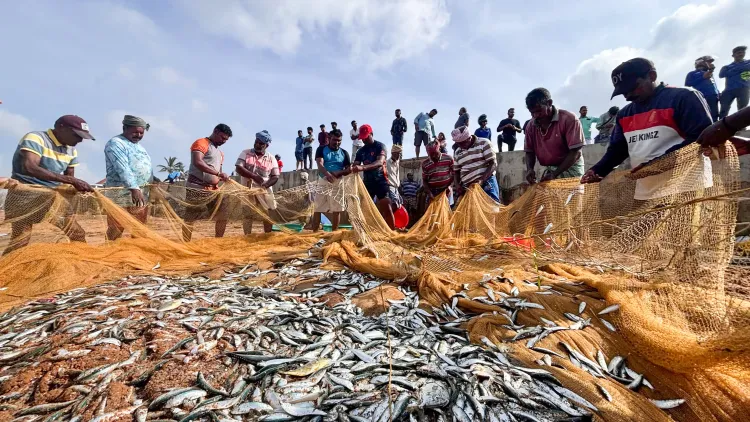How Will the India-UK Trade Deal Boost Seafood Exports?

Synopsis
Key Takeaways
- India-UK CETA provides zero-duty access to 99% of tariff lines.
- Key seafood products to benefit include Vannamei shrimp and lobsters.
- The agreement could double Indian seafood exports to the UK.
- Focus on value addition and workforce training is crucial.
- Economic growth and sustainability are key outcomes of the CETA.
Kochi, Oct 18 (IANS) The India–UK Comprehensive Economic and Trade Agreement (CETA) is set to unlock substantial prospects for India's seafood export sector, as stated by the Marine Products Export Development Authority (MPEDA).
In a recent two-day session with exporters, MPEDA chairman D.V. Swamy urged participants to implement strategies that emphasize value addition and workforce enhancement to maximize the benefits of this agreement.
The CETA agreement, signed in July of this year, allows zero-duty access to 99 percent of tariff lines, significantly boosting the competitiveness of Indian seafood products in the UK market.
Prominent categories such as Vannamei shrimp, frozen squid, lobsters, frozen pomfret, and black tiger shrimp are anticipated to gain directly from this duty-free access.
The meetings served as a venue for industry players to examine the ramifications of the agreement.
Presentations by Anil Kumar P., Joint Director of MPEDA, outlined the essential aspects of CETA, while Alex Paul Menon, Development Commissioner of the MPEZ-SEZ, emphasized the potential for developing a Marine Aquapark SEZ in Tamil Nadu.
Industry stakeholders, including representatives from the Department of Commerce, Export Inspection Agency (EIA), and the Seafood Exporters Association of India (SEAI), along with over 90 exporters from Tamil Nadu, Andhra Pradesh, and Odisha, exchanged views on market prospects and operational tactics.
India's marine product exports totaled $7.45 billion in the 2024–25 period, with shrimp, fish, and cuttlefish making up the majority of the shipments.
Exports to the UK reached 16,082 MT valued at $104.43 million, primarily driven by the demand for frozen shrimp, which comprised 77 percent of total UK shipments, followed by frozen fish at eight percent.
Industry analysts predict that the India-UK CETA could potentially double Indian seafood exports to the UK in the short term.
This agreement is anticipated to spur economic growth, create job opportunities, and foster innovation while promoting sustainable practices within the sector.
Swamy highlighted that seizing this opportunity will necessitate coordinated efforts to elevate product quality, enhance processing capabilities, and train skilled labor to satisfy the growing demand in global markets.
The chairman of MPEDA further noted that through proactive adjustments and strategic investments, Indian seafood exporters can not only expand their market share in the UK but also position India as a competitive, high-value supplier in the international seafood trade.









